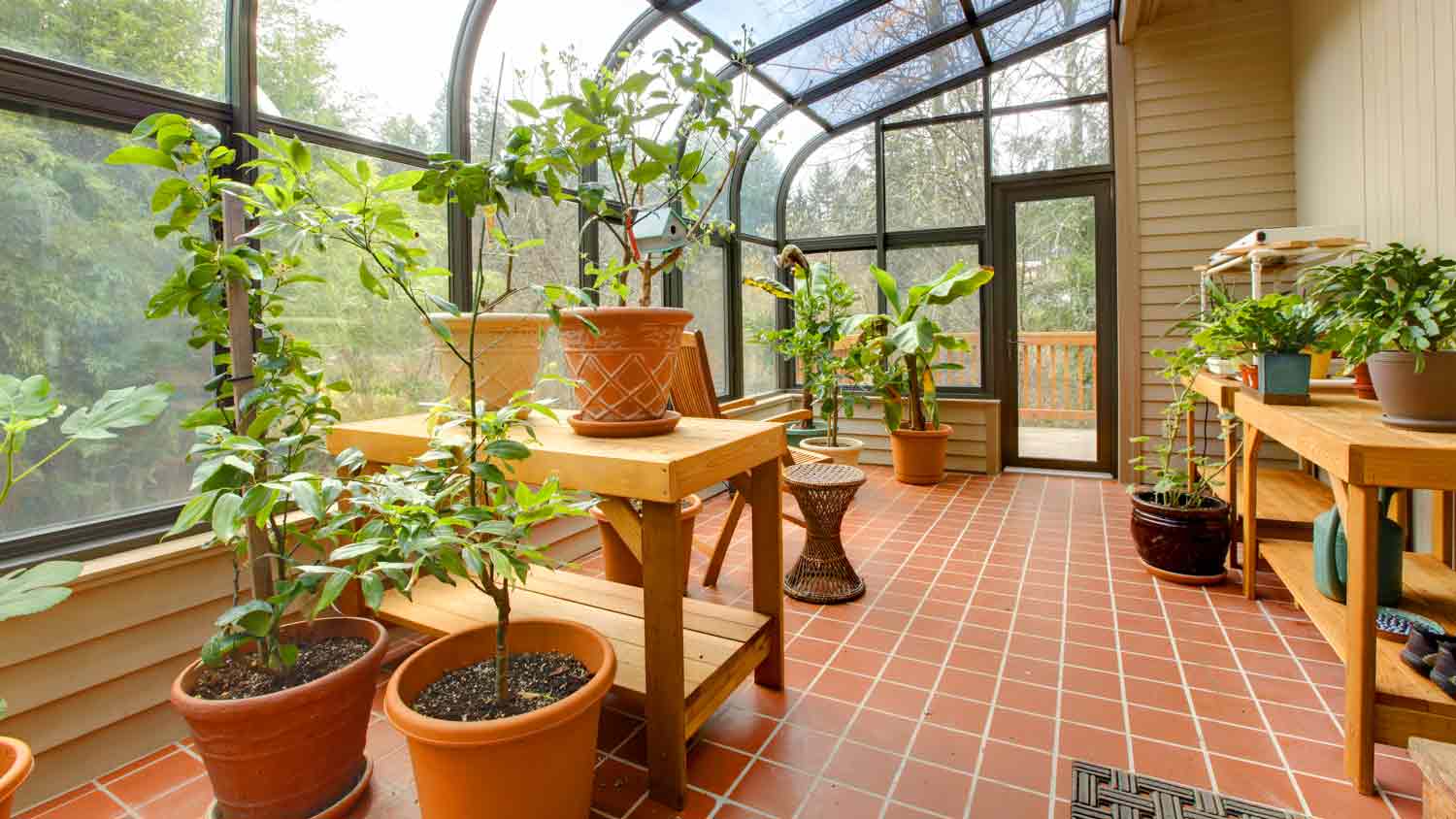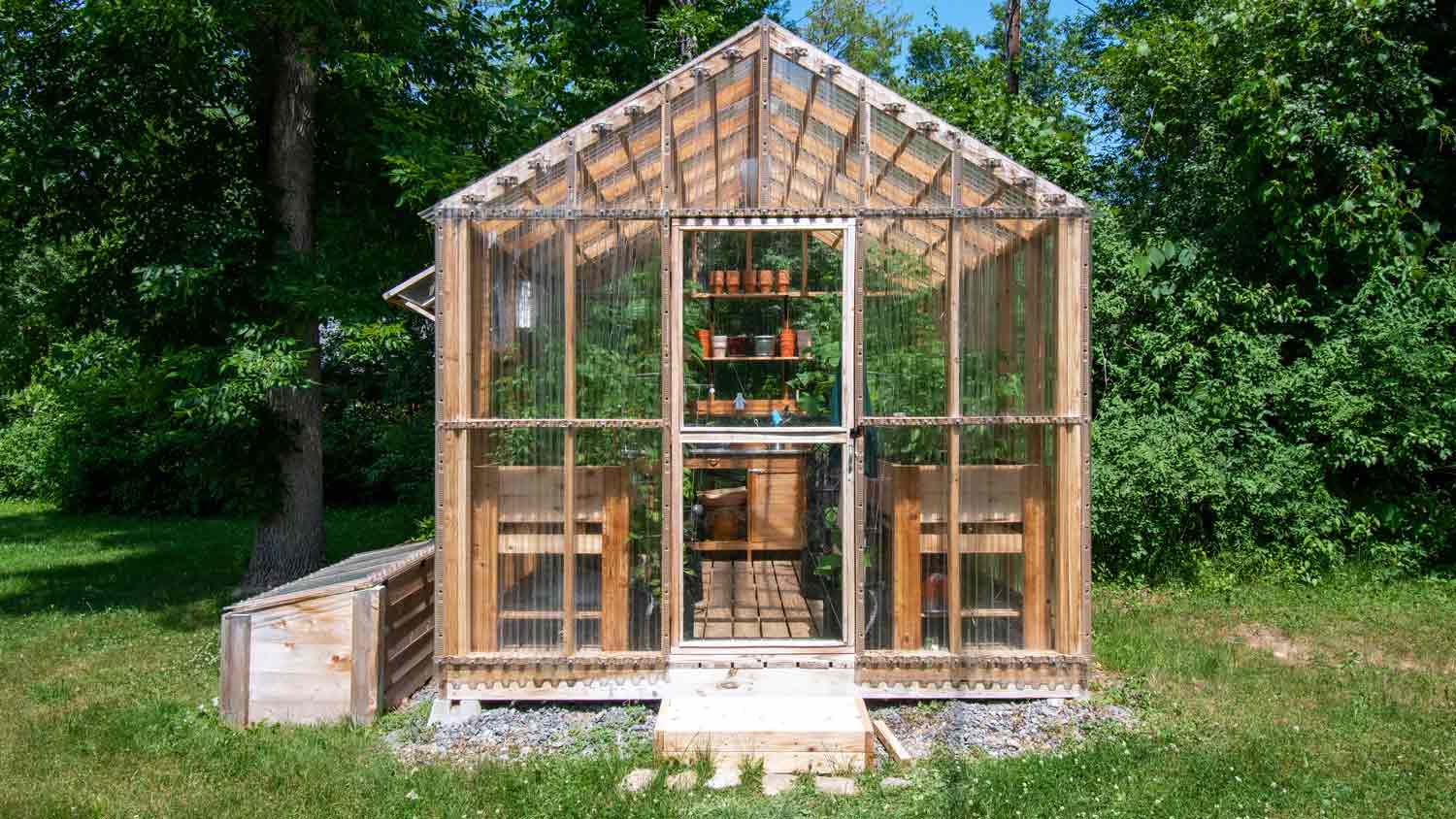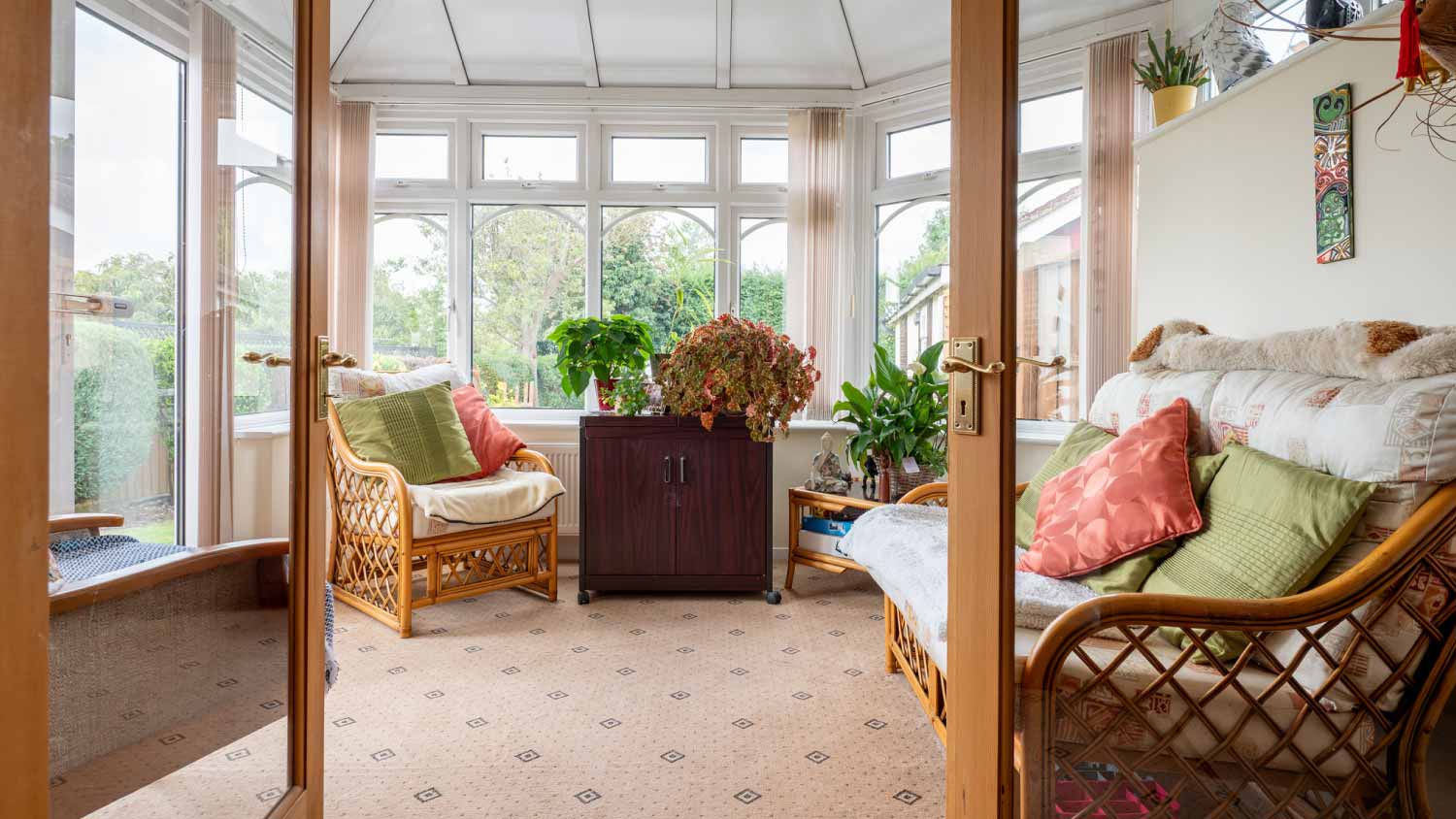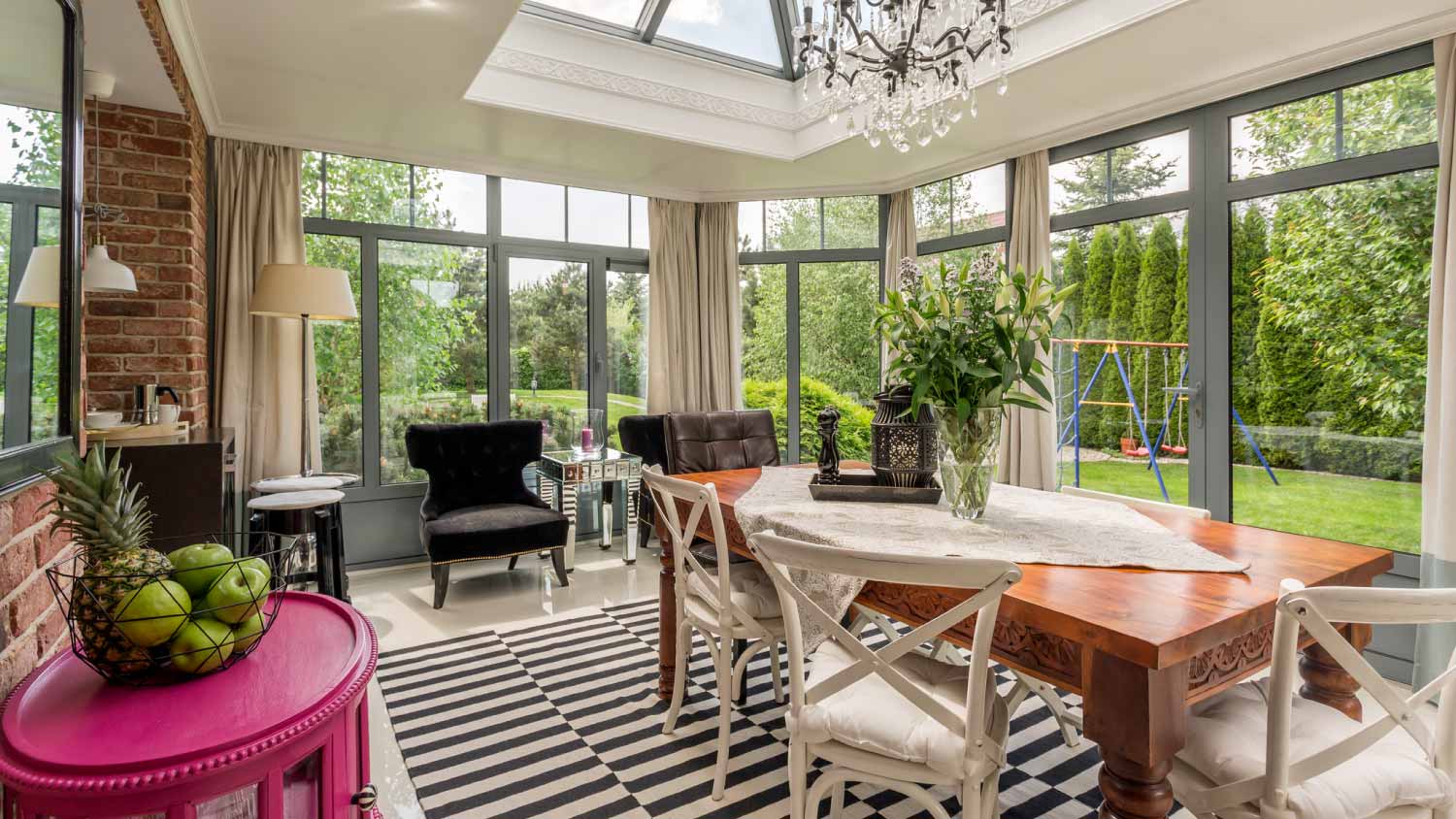Solarium vs. Greenhouse: Pros, Cons, and Costs
Find your perfect place in the sun


Solariums feature a dual purpose for leisure and plant growth.
Greenhouses boast climate control features to ensure optimal growth for various plants.
Both solariums and greenhouses feature year-round benefits for gardening.
Solariums tend to cost thousands more than greenhouses.
Gardening can be a tranquil hobby with the added benefit of providing fresh flowers and produce for your home. If you're ready to take your home garden to the next level, you may weigh the benefits of a solarium versus a greenhouse. Read on to learn how to choose which structure is best for your home and gardening practices.
Solarium vs. Greenhouse: Key Differences
While both are designed to capture sunlight, solariums and greenhouses serve varying purposes. Solariums are attached to homes, enclosing the room with extensive glass walls and roofs. These types of rooms can be used for planting or leisurely enjoyment. Greenhouses are stand-alone or lean-to structures designed specifically for horticulture, with controlled climates to help plants flourish throughout the year.
What Is a Solarium?
A solarium is built with walls and ceilings made entirely of glass to maximize natural light exposure. Attached to homes, solariums are a versatile space for leisure, providing a warm, sunlit area to relax and enjoy the outdoors regardless of the weather. While often used synonymously with sunrooms, the main difference between a solarium versus a sunroom is that a solarium features more sunlight.
Besides being a tranquil retreat, a solarium can also support the growth of certain plants, particularly those that thrive in bright, indirect sunlight. While not designed with the specialized climate control systems found in greenhouses, solariums offer sunny solace for a variety of houseplants.
| Solarium Pros | Solarium Cons |
|---|---|
| Provides natural light | High construction cost |
| Aesthetically appealing | Requires frequent maintenance |
| Versatile use | May lack privacy |
| Increases home value | Difficult to control the temperature |
| Year-round enjoyment | Lacks energy efficiency |
Best for:
Homeowners looking for rooms with abundant natural light.
Growing houseplants that thrive in bright, indirect sunlight, such as tropical and subtropical species.
Creating a tranquil space dedicated to relaxation and enjoying outdoor views.
Pros of a Solarium

Solariums are highly versatile, multi-purpose spaces that can be used for relaxation, dining, entertaining, or growing houseplants that thrive in bright, indirect light. They offer year-round enjoyment, providing a comfortable space to experience the outdoors in any weather.
As far as looks go, solariums enhance a home's aesthetic appeal. One of the most notable advantages is the abundant natural sunlight, which creates a bright and inviting atmosphere that is sure to boost your mood.
Aesthetically, solariums add a beautiful and modern architectural feature to a home, seamlessly blending indoor and outdoor spaces with their expansive glass walls. This design element not only enhances the visual appeal of the property but can also increase its market value.
Cons of a Solarium
One of the primary disadvantages of solariums is the high initial cost of construction and the ongoing maintenance expenses. Building a solarium requires significant investment, and maintaining the extensive glass surfaces may require specialized cleaning to keep them clear of streaks.
Another drawback is that solariums can pose challenges in temperature control. Without proper insulation and climate control measures, they can become uncomfortably hot during the summer and too cold in the winter. Combating this may require additional heating and cooling, which can drive up energy costs.
Privacy is another concern with solariums due to their extensive glass walls, which can make the interior visible from the outside. This issue can be mitigated by installing blinds or shades, but this adds to the cost.
What Is a Greenhouse?

A greenhouse is a green thumb’s best friend—but they’re for plants, not people. This outdoor structure provides a controlled environment with perfect conditions for plant growth. Constructed with transparent materials such as glass or plastic, greenhouses allow sunlight to penetrate while trapping heat, creating a warm and stable climate. Equipped with systems to regulate temperature, humidity, light, and ventilation, greenhouses ensure plants receive necessary conditions year-round.
| Greenhouse Pros | Greenhouse Cons |
|---|---|
| Extends growing season | High upfront cost |
| Controlled environment | Maintenance |
| Protection from pests and diseases | High energy consumption |
| Versatile for plant types | Requires space on property |
| Increased self-sufficiency | Complex management |
Best for:
Homeowners who enjoy year-round gardening.
Homeowners growing a variety of plant species with different climate requirements.
Self-sustainable homeowners looking to grow their own fresh produce.
Pros of a Greenhouse
A greenhouse allows for year-round plant cultivation regardless of Mother Nature's plans. This means gardeners can continue growing and harvesting crops even during the cold winter months. Temperature, humidity, and light can be carefully regulated to provide optimal conditions for plant growth, promoting healthier plants and higher yields.
Greenhouses are incredibly versatile and suitable for cultivating a variety of plants, including vegetables, flowers, and exotic species that might not thrive in all climates. Gardeners can experiment with different types of plants and expand their gardening horizons.
For homeowners who want to live a self-sufficient lifestyle, greenhouses support fresh produce growth year-round. This provides a reliable, nutritious food source and reduces dependency on store-bought produce. Greenhouses also protect against pests and diseases by creating a barrier between plants and the outside world, significantly reducing the risk of infestations and infections and minimizing the need for chemical pesticides.
Cons of a Greenhouse
While greenhouses boast excellent benefits, it comes with a high price tag. There is a high initial cost associated with constructing and setting up a greenhouse, including expenses for materials, installation, and the necessary equipment for climate control, such as heating, cooling, and irrigation systems.
Maintaining a greenhouse can also be labor-intensive and costly, requiring regular cleaning, repairs, and monitoring to ensure all systems function properly. The process can be complex and time-consuming and requires a good understanding of plant care, climate control, and the specific needs of different plant species. This can be a steep learning curve for beginners and might require additional time and effort to troubleshoot and address issues that arise.
To maintain optimal growing conditions year-round, greenhouses require substantial energy for heating in winter and cooling in summer. This can lead to increased utility bills and a larger carbon footprint, potentially offsetting some of the environmental benefits of homegrown produce. Building a greenhouse requires ample outdoor space, which can pose a challenge for homeowners who live in densely populated areas.
Greenhouse vs. Solarium
Now, let’s examine which option is the best in terms of appearance, cost, installation, and more.
Appearance: Solarium
While beauty is often in the eye of the beholder, solariums tend to have a more aesthetically pleasing and architectural appeal than greenhouses. Solariums enhance a home's visual appeal, offering a bright, elegant space for relaxation and leisure. Greenhouses are primarily utilitarian structures, with less emphasis on blending with the home's overall design.
Options and Customization: Greenhouse
Greenhouses can be tailored to meet specific horticultural needs, with various designs, sizes, and features to optimize plant growth. Customization options include advanced climate control systems, automated watering and ventilation, specialized lighting, and shelving configurations to accommodate different types of plants. While solariums can also be customized to some extent, their main use as leisure spaces limits how much you can modify them.
Durability: Solarium
Solariums are constructed with high-quality materials like reinforced glass and robust framing to withstand various weather conditions. Their design and construction standards also align with those of the main house to ensure structural integrity. While greenhouses are built to withstand the elements, lighter materials such as plastic panels and aluminum frames are often used and more prone to wear and tear.
Price: Greenhouse
Greenhouses and solariums can both be expensive to build, but greenhouses are less expensive due to the materials used. The average greenhouse cost is $8,700, but depending on the structure, it ranges between $3,070 and $15,250. Solariums are much more expensive to build, with the average solarium addition cost ranging between $30,000 and $80,000.
Ease of Installation: Greenhouse
Greenhouses are easier to install, as some can be assembled from pre-fabricated kits, which include all necessary components and detailed instructions. A greenhouse builder near you can install these kits relatively quickly and they don't require significant modifications to a home's existing structure. Solariums feature more complex installations that must meld with the existing building and meet local building codes. For these reasons, you should call a local solarium contractor to handle their installation.
Ease of Repair: Greenhouse
Greenhouses are built with modular components and basic materials that are easy to replace or repair. If a panel breaks or the frame gets damaged, it’s straightforward to repair or replace it individually. Repairs to solariums often require specialized skills and materials to ensure structural integrity and aesthetic consistency with the rest of the home.
Maintenance: Tie
While some of the maintenance tasks vary for solariums and greenhouses, both can be time-consuming to maintain. Solariums, with their extensive use of glass, require quite a bit of upkeep to keep the windows clean and free of smudges. Greenhouses do feature a great deal of windows that may require cleaning, but due to the functional nature of greenhouses, cleanliness isn’t as big a priority as with solariums. However, the climate control for greenhouses requires frequent upkeep to keep your plants thriving.
Sustainability: Greenhouse
Greenhouses have a slight environmental edge over solariums as the practice of growing plants can contribute to sustainability practices. This can offset some of the environmental effects of maintaining a greenhouse climate, which can increase energy consumption. Solariums can be used for plant growth but not in the robust way greenhouses can. Due to the glass construction of solariums, maintaining temperatures can be challenging and requires more energy usage.
Resale Value: Solarium
The addition of a solarium can increase a property's overall marketability and attractiveness. Solariums enhance a home's aesthetic appeal and living space, designed for comfort and relaxation and offering panoramic views and natural light that appeal to potential buyers. House hunters may not be interested in a greenhouse if they aren't gardeners, but a solarium is multi-purpose.















